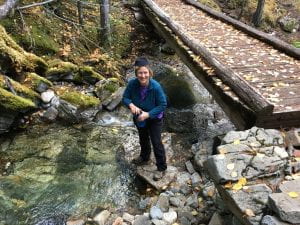Nancy Johnson has been a professor in the English Dept. for 25 years, with specialties in English Education, and Children’s and Young Adult Literature. She retired at the end of Winter quarter 2019. We caught up with Nancy to ask her a few questions as she embarks on this next phase of life! (See also the “Gratitudes” page for information on a new Endowment set up in Nancy Johnson’s honor.)
 How long did you teach at WWU? What brought you here?
How long did you teach at WWU? What brought you here?
In 1993 Seattle hosted the NCTE (National Council of Teachers of English) Convention. Bill Smith approached me at the conclusion of a session I moderated suggesting I apply for an English Education opening at WWU. I didn’t know Bill at the time but was flattered that he sought me out and charmed by his kindness (which I appreciated even more as his colleague). But, the timing? It just wasn’t right. I had recently received tenure at Seattle Pacific University. I was getting married in a month. And we just bought a house. But … Bill persisted, contacting me one month later and flattering me with “you’d be perfect for this job and our students” praise. I applied, was hired, and started what became a 10-year commute from Seattle to WWU and a 25-year career. No regrets!
What were some of your favorite moments from your career at WWU?
More than moments, what will linger a long, long time are relationships. Students. Colleagues. Amazing educators, librarians, writers, and artists in the community. I’ve loved the everyday “work” of inviting, nudging, supporting, and sharing challenging experiences in the classroom, often ignited by responses to literature. I value the hours we worked side-by-side on big projects: creating WWU’s nationally recognized Children’s/Young Adult Literature Conference, collaborating to host a lively Poetry Camp (for grown ups!), and hosting renowned poet Naomi Shihab Nye’s Arbuthnot Lecture on WWU’s campus. None of that could have happened without dedicated relationships to shared dreams.
What is your secret “super power”? Tell us something that others may not know about you.
I hope to live long enough to see my beloved Seattle Mariners return to the playoffs (will I jinx it all if I also hope for a World Series?). I aim to attend games in all 30 Major League ballparks (so far, I’ve visited 19). And, this summer I’ll return to Cooperstown to see Ed-gaaar inducted into the Hall of Fame. While not a super power (my batting average is well below the Mendoza Line), I do claim to be a super fan.
What stirs joy within you outside of your work?
In addition to family, my life is so much richer because I’ve left home. In terms of joy, this comes from: Unexpected, unplanned, sometimes eye-opening, often jaw-dropping moments when I travel. People stepping in to help when I’m lost or confused (usually due to language mismatch). The kindness, grace, rich laughter, and shared humanity I’ve discovered whenever I step outside the USA. Filling every page in my passport before it expires.
What will be your next adventure?
Travel. Travel. And more travel. Isn’t there an adage, “So many places, so little time”? I want to take full advantage of this one life I have to life. This includes some exciting new ventures that will nourish my learner/teacher soul. I just started a multi-year consulting partnership with English/language arts teachers in the Lynden School District and, in the fall I’ll travel to the International Youth Library in Munich, Germany for a two-month fellowship. More immediately, I’m eager for lazy, sunny days reading on my deck until the sun sets, long walks on Bellingham’s amazing trail system, time with family and friends, and — did I mention? — travel.


